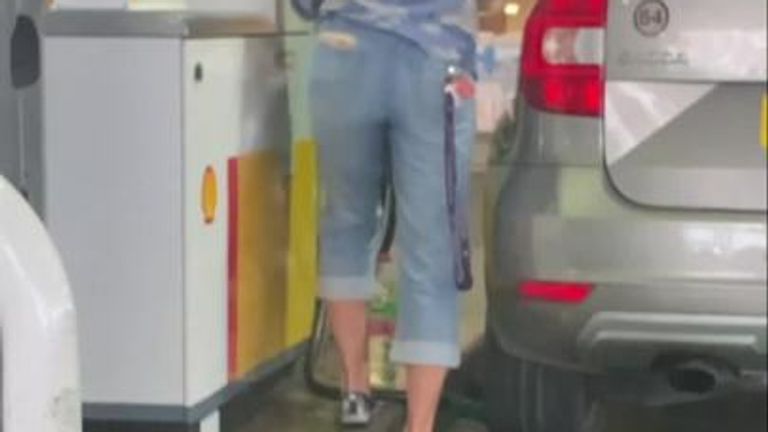Fuel crisis ‘stabilising’, industry says, as Shapps urges return to ‘normal buying habits’
The fuel crisis has “stabilised” and there are “early signs” it is coming to an end, industry members have said, as the transport secretary echoed their comments and called for “normal buying habits” to return.
Esso said the situation at 200 sites it operates which include a Tesco Express shop had “stabilised” and things appeared to be “improving in terms of fuel availability”.
And the Petrol Retailers’ Association said an increasing number of its members are now “reporting taking further deliveries of fuel”.
It added: “We have conducted a survey of our members this morning and only 37% of forecourts have reported being out of fuel today.
“With regular restocks taking place, this percentage is likely to improve further over the next 24 hours.
“There are early signs that the crisis at pumps is ending.”
Earlier, the transport secretary said “very tentative signs of stabilisation” are being seen on petrol forecourts following days of long queues and empty pumps across the country.
Grant Shapps said the sooner people returned to their normal habits and stopped panic buying petrol and diesel, the quicker the fuel supply crisis would start to ease.
He said queues are likely to continue in the coming days, but fuel levels on forecourts are beginning to increase.
“A lot of petrol is now being transferred into people’s cars and there are now the first very tentative signs of stabilisation in the forecourt storage which won’t be reflected in the queues as yet, but it’s the first time we’ve seen more petrol in the petrol stations itself,” the cabinet minister said.
“The sooner we can all return to our normal buying habits, the sooner the situation will return to normal.
“We all need to play our part and certainly don’t do things like bring water bottles to petrol stations – it is dangerous and extremely unhelpful.”
Responding to criticism that government action – such as putting the army on standby to deliver fuel where it is needed the most – has been slow, the cabinet minister said, “numerous different measures” had been put in place since April to remedy the supply crisis which has been caused by a shortage of fuel tanker drivers.
Denying the government had ignored warnings for months about a looming driver shortage, Mr Shapps said: “We have already put 18 different steps in place, which I should say stretch right the way back to the spring.”
He said as a result of the measures put in place, the system was just about coping until last weekend, and would have continued to, but for the “stampede” in panic buying.
“Unfortunately, as we have seen with toilet rolls and other things, once people start to pursue a particular item it can quickly escalate…there is almost nothing you can do to the supply system to prevent it,” he said.
“But there is only so much petrol you can transfer into tanks. That is starting to work its way through.”
Mr Shapps said the primary cause of the shortages had been the cancellation of HGV driver testing last year due to the coronavirus pandemic, which he said had delayed 30,000 drivers from taking their tests.
However, he also acknowledged the role of Brexit in the crisis.
“Brexit I hear mentioned a lot and it no doubt will have been a factor,” he said.
“On the other hand, it has actually helped us to change rules to be able to test more drivers more quickly. So, it has actually worked in both ways.”
Follow the Daily podcast on Apple Podcasts, Google Podcasts, Spotify, Spreaker
Army tanker drivers have been put on a state of readiness should they be needed to ease the chaos on fuel supply chains.
Motorists are still facing long queues at filling stations, with fights reportedly breaking out on some forecourts as petrol pumps run dry and limits on sales are imposed.
Under the government’s emergency 10-point plan for dealing with fuel crises, fuel sales could be rationed and forecourt opening hours limited to try and tackle panic buying.
There have been calls for key workers including healthcare staff and teachers to be given priority access to petrol pumps, as desperate drivers are held up in mile-long queues at some stations.
The British Medical Association has warned essential services could be hit and the NASUWT teachers’ union has said there is a risk of further disruption to education – if staff are unable to get to work.
Despite government appeals for motorists to fill up as normal, the Petrol Retailers Association (PRA) said on Tuesday there is little sign of that happening – with social media driving the dash to the pumps.
“As soon as the tanker arrives at a filling station people on social media are advising that a tanker has arrived and it is like bees to a honeypot,” its chairman Brian Madderson told the BBC Radio 4 Today programme.
“Everyone flocks there and within a few hours it is out again.”
For all the latest business News Click Here



